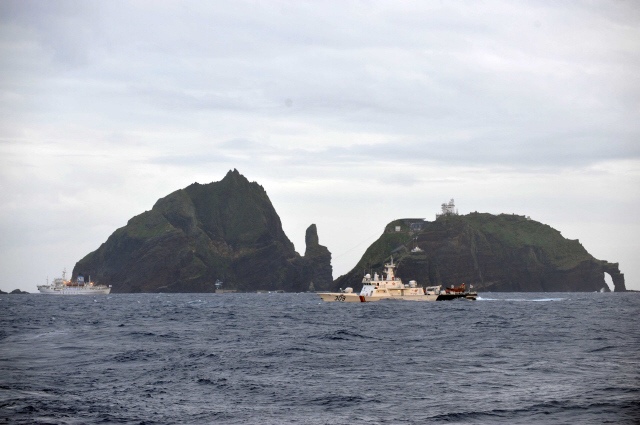 |
|
The island of Dokdo (Hankyoreh archives)
|
New teaching guidelines mandate educators to describe Dokdo as Japanese territory
The Japanese government announced plans to move up the institution of mandatory “national territory education” claiming the Dokdo islets as Japanese territory by three years from its originally scheduled date. The government also unveiled a manual on government teaching guidelines reflecting the change. The manual is intended as a reference for teachers, presenting material in an accessible way so that it can be taught effectively to students according to the government teaching guidelines. On July 17, the Japanese Ministry of Education, Culture, Sports, Science and Technology (MEXT) announced teaching guideline enforcement measures moving the date for instituting the mandatory teaching of Dokdo as “Japanese territory” in high schools up to 2019 from the originally scheduled 2022. In March, MEXT announced a planned amendment to high school teaching guidelines characterizing both Dokdo and the Senkaku (Diaoyu) Islands – the subject of a territorial dispute with China – as “Japanese territory.” It also included language describing South Korea as “illegally occupying” Dokdo. The previous high school teaching guidelines (amended in 2009) instructed schools to institute national territory education, but did not include content describing Dokdo or the Senkaku Islands as Japanese territory. Last year, the Japanese government amended its elementary and middle school teaching guidelines to include claims of Dokdo as “Japanese territory.” The amendment of the high school guidelines as well means that the claims of Japanese ownership of Dokdo will become a mandatory part of education across the elementary, middle, and high school curriculum. In a statement the same day, the South Korean Ministry of Foreign Affairs expressed “great dismay at the Japanese government’s decision to amend its high school government teaching guideline manual to reinforce false claims about Dokdo, which is South Korean territory.” “We strongly urge the immediate withdrawal of [the decision],” it continued. “The Japanese government must not make ridiculous claims based on a mistaken historical understanding of Dokdo, which is clearly South Korean territory, and we sternly note that if they instill this [belief] in their future generations, they are forfeiting an opportunity to reflect on past mistakes and proceed toward a new future,” it said. By Cho Ki-weon, Tokyo correspondent, and Kim Ji-eun, staff reporter Please direct comments or questions to [english@hani.co.kr]






